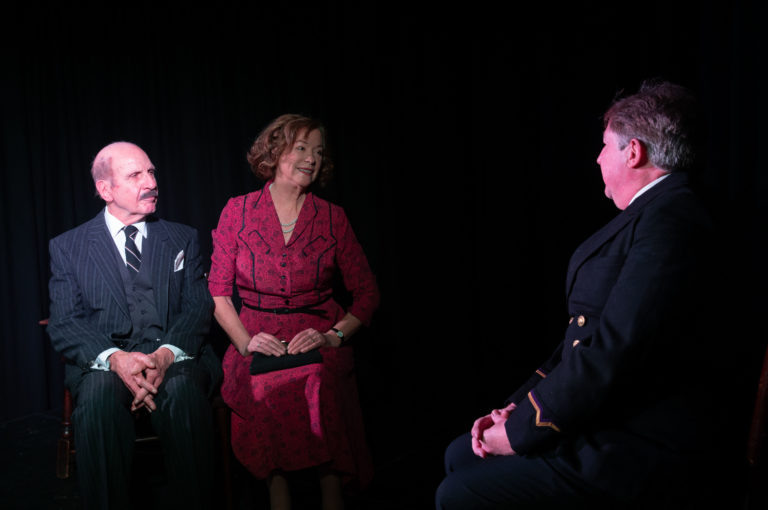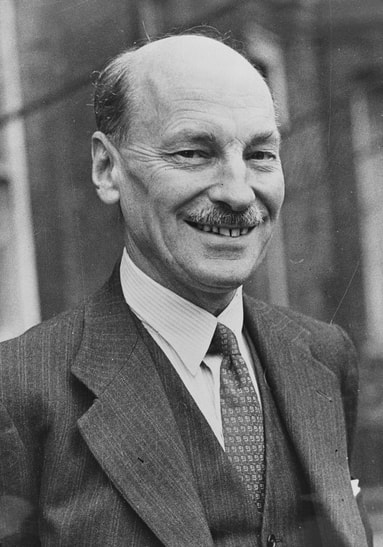
It is June 1945, Germany has surrendered to the Allies – and in Britain, change is afoot. Forced to call a general election, Winston Churchill tells the country that, to implement its policies, “The Labour party would have to fall back on a form of Gestapo”.
I wasn’t aware of this statement, so the opening scene of Francis Beckett’s play came as a shock. Why would Churchill have made such an inflammatory remark? It backfired badly, as the Tories lost the election by a landslide and to everybody’s surprise – except, perhaps, his own – Clement Attlee found himself the head of a Labour government.
“You probably haven’t had chance to think about what you’ll do as Prime Minister. Take my advice and don’t try to change anything” is King George VI’s frosty greeting to Attlee, the first time the two men meet (the king was a close personal friend of Churchill).

And so ensues a series of highly entertaining scenes featuring the main political players of the day: Clem Attlee and his wife Violet, Herbert Morrison, Ernest Bevin, Hugh Dalton and Nye Bevan and his wife (and fellow Labour MP) Jennie Lee.
From the outset, it’s clear that ‘The Little Man’, as his colleagues nicknamed him, has an almighty job on his hands. Not only in Britain “mired in debt”, and dependent upon American loans, the Labour party is riven with in-fighting; even the general public seem taken aback by their choice of Prime Minister: “An empty taxi drove up and Clement Attlee got out”, remarked one commentator.
Yet Attlee proved to be made of steel. Throughout the play we see him coping with equanimity with the backstabbing and attempts to depose him by his Labour colleagues. The scenes in which he spars with his Deputy PM, Herbert Morrison, are delicious; the two men were such different characters it’s a wonder they managed to work together at all. The oh-so-charming Hugh Dalton was no better, plotting & scheming – albeit unsuccessfully.
And always, looming in the background, was the shadow of Winston Churchill. The question this play’s promotional literature asks is “How can the insignificant, passionless little Labour leader Clem Attlee possibly compete with Churchill?” The answer is, of course, that he didn’t try to. The play makes it clear that Attlee ploughed his own furrow, saying little, but observing a great deal. One of the things I liked most about Roger Rose’s performance was how a gesture or facial expression conveyed so much than the abrupt, pithy sentences Attlee was inclined to utter.
It would be impossible, in a 90-minute play, to capture all of Attlee’s extraordinary achievements or the political turmoil of the 1940s – and wisely, Francis Beckett doesn’t try to do so. Instead, he focuses on the personalities and their relationships with each other, constantly referencing the events they were living through – and shaping.
I hadn’t realised how much opposition Attlee faced within his own party towards introducing a welfare state. Whilst sympathetic, Morrison and others were concerned by how much it would cost, bearing in mind how much debt the country was in.
In ‘A Modest Little Man’, we see a determined Attlee sticking to his guns, determined to fulfil his vision. The NHS is so much a part of our daily lives now that it’s difficult to understand how controversial the idea of free healthcare was; even the medical profession was against it. We have much to thank Clem Attlee, and Nye Bevan, for.
Not that there isn’t a price to pay for free schooling and healthcare and the play doesn’t shy away from that: during the 1940s, Labour introduced the highest taxes the country had ever experienced – “but decent society doesn’t come cheap”, comments Attlee, puffing furiously away on his pipe. The play also doesn’t shy away from Attlee’s privileged upbringing; his father was a senior partner in a city law firm, educating his son at Haileybury and Oxford. Attlee, however, was deeply affected by the poverty he witnessed whilst working in the East End of London, which led to his conversion to socialism.
I enjoyed getting to know Violet Attlee’s character. Fiercely loyal to her husband, she was also his “official” driver (can you imagine that in this day & age?) and understood better than anyone how his mind worked. Lynne O’Sullivan’s lovely performance recognises how important Violet was in furthering Attlee’s career, whilst portraying her as very much her husband’s equal.
The scene in which Violet and Jennie Lee meet is a joy to watch and I would have liked to have seen more of the female leads; in fairness to Beckett, he makes them as well-rounded as possible – but this is, ultimately, a play about their husbands and an extraordinary period in British history.
I loved every minute of ‘A Modest Little Man’ and learned a lot, too – especially about the man of whom Professor Lord Peter Hennessy has said: “He used silence, modesty and understatement as weapons. Long may he remain the exemplary Prime Minister.”

Is this back on again? Where?
LikeLiked by 1 person
It was on at Upstairs at the Gatehouse for two nights – apologies, I should’ve said so in my post. I assume that it’s continuing to tour, but haven’t been able to find out where it’s going next.
LikeLike
Will look out for it. I’ve managed to miss it several times!
LikeLiked by 1 person
Third time lucky, hopefully 🙂
LikeLike
Sounds like an interesting play! I haven’t been to a play in ages. There used to be a place here called The Beverly Dinner Playhouse that would have well known stars come in and perform in plays and you also had an open bar and buffet. I loved it. I remember seeing Caesar Romero and Martha Raye there. This was the story of the place: https://www.theadvocate.com/gambit/new_orleans/news/blake_pontchartrain/article_19c707ce-2f69-5d68-b3a2-d507300a5b41.html
LikeLiked by 1 person
Sounds like a interesting play.
LikeLiked by 1 person
It really was – I learned so much.
LikeLike
Thank you for your interesting review of “A Modest Little Man”. Sounds fascinating. My time in London is infrequent and short but I will find a way to see this play. Many thanks. M x
LikeLiked by 1 person
Do go to see it if you get chance – it was wonderful. And if you fancy meeting for a coffee or a glass of wine beforehand, let me know!
LikeLiked by 1 person
Thanks so much Liz. M x
LikeLiked by 1 person
Sounds like a interesting play.
LikeLike
I would love to see this play! You have whetted my appetite and it’s just too far away 🙂 — glad you got to go and thanks for sharing such a wonderful description.
LikeLiked by 2 people
I’m so glad you enjoyed the post – and I hope that, one day, you get the chance to see this fabulous play.
LikeLike